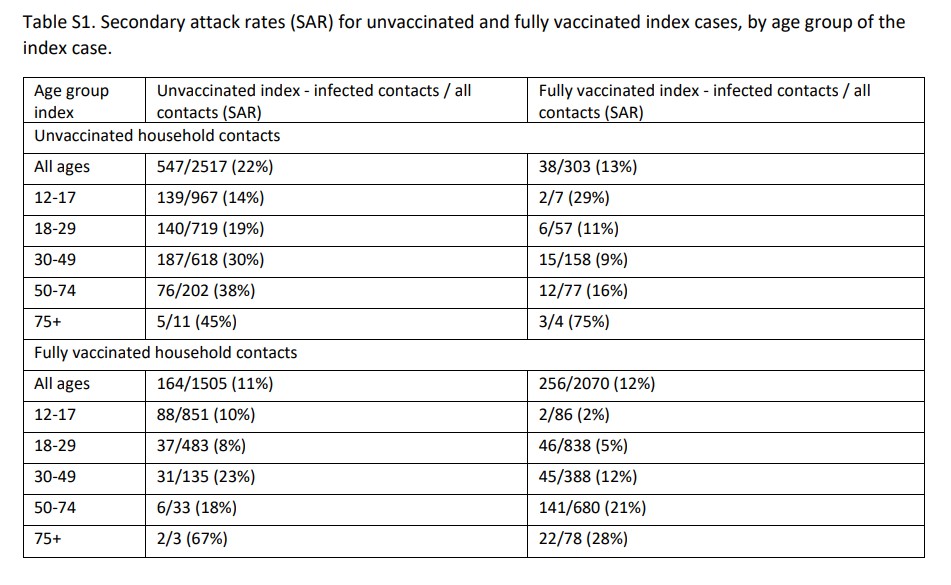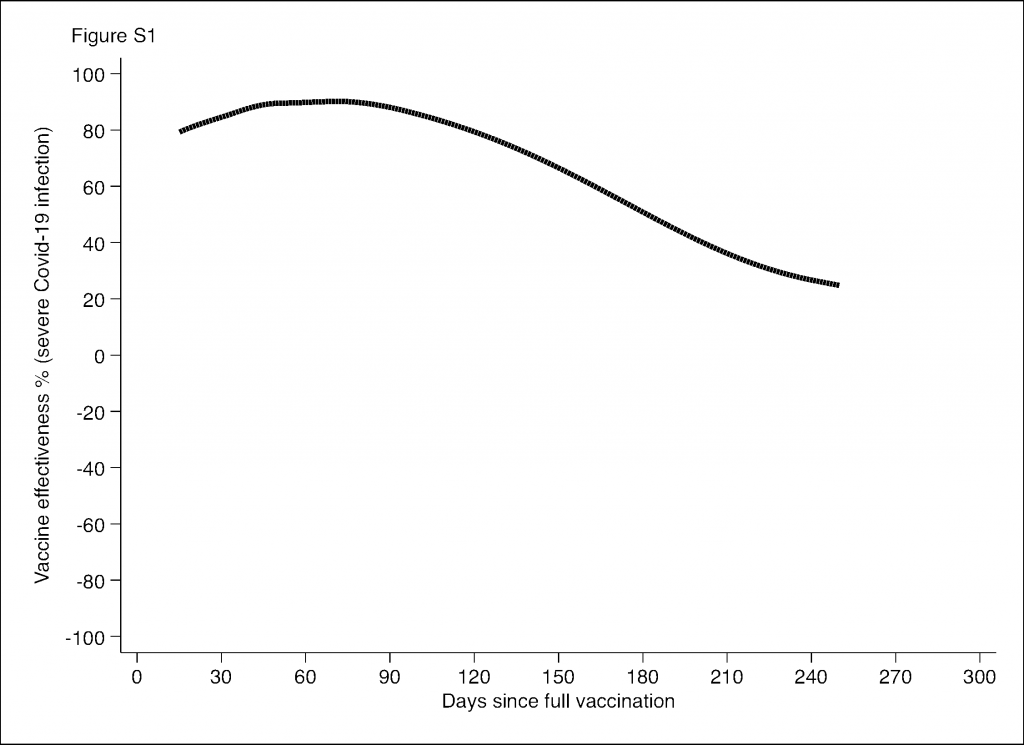To judge from recent scientific and media output, there appear to be two parallel realities currently existing side-by-side in Covid world. In one, the vaccines are highly effective at preventing infection and transmission, and any data that suggests otherwise is being misrepresented or is biased or contains some kind of basic error. In the other – the one that bears a much closer resemblance to the one we actually live in – vaccine effectiveness against infection has been declining significantly and after six months is basically zero. At some point, one of these realities is going to have to give way because they can’t both be true. I know which one my money’s on.
An example of the first appeared in New Scientist this week, headlined: “How much less likely are you to spread COVID-19 if you’re vaccinated?” The answer: at least 63%, according to a new population-based pre-print study from the Netherlands.
A recent study found that vaccinated people infected with the Delta variant are 63% less likely to infect people who are unvaccinated.
This is only slightly lower than with the Alpha variant, says Brechje de Gier at the National Institute for Public Health and the Environment in the Netherlands, who led the study. Her team had previously found that vaccinated people infected with Alpha were 73% less likely to infect unvaccinated people.
What is important to realise, de Gier says, is that the full effect of vaccines on reducing transmission is even higher than 63%, because most vaccinated people don’t become infected in the first place.
De Gier and her team used data from the Netherlands’ contact tracing system to work out the so-called secondary attack rate – the proportion of contacts infected by positive cases. They then worked out how much this was reduced by vaccination, adjusting for factors such as age.
The data comes from August and September 2021, when Delta was dominant in the Netherlands. The key table, breaking the figures down by whether the index case and contacts were vaccinated, is below.

When you see this table you realise why the headline claim focuses on how easy it is to infect people who are unvaccinated. There the SAR drops from 22% to 13% when the index case is vaccinated (a 41% drop; the rest of the 63% vaccine effectiveness comes from adjustments). However, look at the results for infecting vaccinated contacts (bottom half). There the SAR rises from 11% to 12% when the index case is vaccinated.
The authors say this is due to confounding by age and that the adjusted vaccine effectiveness against transmission works out at 40% (though with a wide confidence interval of 20-54%). Be that as it may, note that for those aged 50-74 the SAR still rises from 18% to 21% when the index case is vaccinated, and that isn’t confounded by age (though the sample size for the 18% figure is small). Since one of the main claims in the paper is that the lower SAR for vaccinated index cases is a result of them being less infectious, it’s hard to explain why vaccinated people aged 50-74 appear to infect more of their vaccinated contacts, not fewer.
There are other problems with the study. One is that on July 8th, the Netherlands changed its rules to allow vaccinated contacts not to self-isolate while unvaccinated contacts were still required to do so: “On July 8th, 2021, a policy change was implemented, and fully vaccinated household contacts of confirmed cases no longer had to quarantine.”
This means the unvaccinated contacts were confined to the home with their infected housemate while the vaccinated were permitted to get out of there and breathe God’s clean air. Without seeing data from before this change it’s hard to know how much of a difference it made, but it may be significant.
Another problem is the authors didn’t exclude infections being counted as secondary even if they were discovered the following day, meaning the study will likely include many co-primary cases which are normally excluded. This may explain why the SAR values are much higher than those reported by Public Health England (typically around 10%). What difference this would make to the difference between the vaccinated and unvaccinated figures is uncertain, however.
A bigger problem is that it appears the unvaccinated cohort includes those within 14 days of their first jab, a period shown in numerous studies to be one of heightened infection risk. This will inflate the infection rate in the ‘unvaccinated’ so it would be good to see the analysis with these infections excluded.
The New Scientist article goes on to cite the Oxford/ONS study from August claiming it supports these findings, but that study also had numerous flaws that I have discussed previously.
In any case, whatever the reason this study found a significant impact on transmission, a new study from Sweden has appeared that brings tidings from the other reality – the one where high observed levels of spread among the vaccinated translate to a decline to zero vaccine efficacy within months.
The study (a Lancet pre-print) finds that Pfizer vaccine effectiveness wanes from 92% at day 15-30 to 47% at day 121-180, and from day 211 (seven months) and onwards “no effectiveness could be detected”. For AstraZeneca, vaccine effectiveness “was generally lower and waned faster, with no effectiveness detected from day 121 [four months] and onwards”. (The figure they found was actually negative, minus-19%.)
While effectiveness against severe outcomes held up for many groups over nine months, it was found to wane significantly among men, older frail people, and people with comorbidities, contributing to an overall fall from 89% at day 15-30 to 42% from day 181 (six months) and onwards, with a number of subgroups even showing negative efficacy against severe outcomes.
The graphs included in the paper are reproduced below. Note the negative effectiveness against infection at nine months (top chart) and the effectiveness against severe outcomes down to around 20% at eight months (bottom chart).


The confirmation here of vaccine effectiveness against infection declining to zero will not come as a surprise to readers of the Daily Sceptic, though it may baffle readers of the New Scientist and others living in the parallel reality of highly effective vaccines. The sharp waning against severe disease is more of a surprise given recent data from PHE/UKHSA, and is worth watching closely.












To join in with the discussion please make a donation to The Daily Sceptic.
Profanity and abuse will be removed and may lead to a permanent ban.